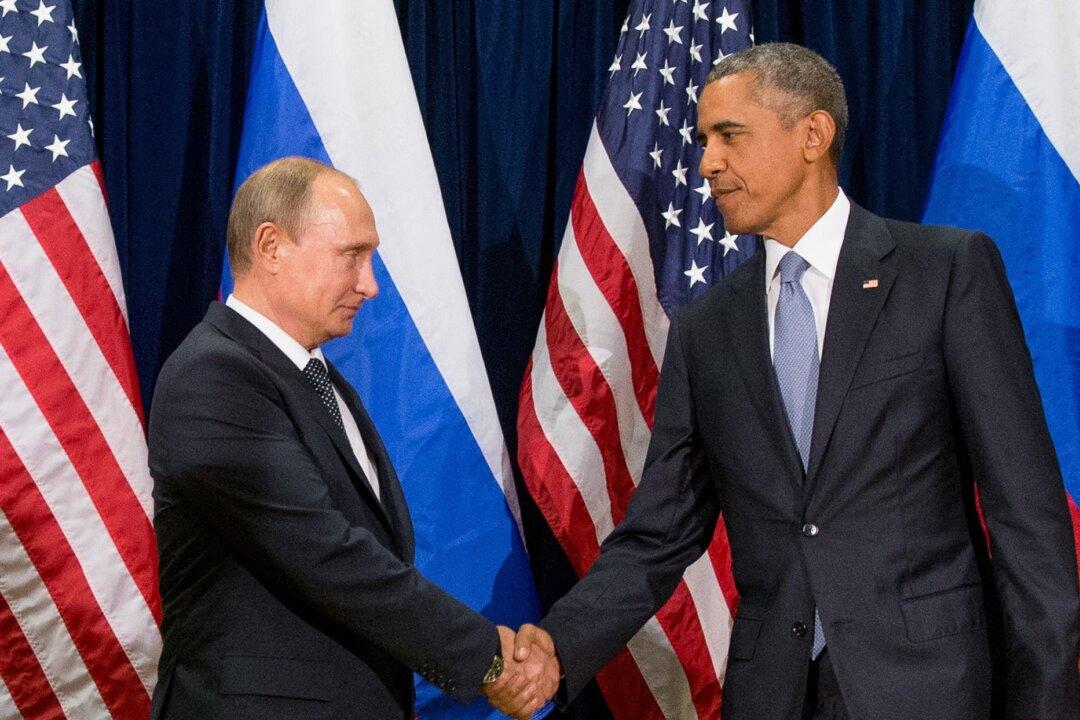MOSCOW—In a striking shift, President Barack Obama and Russian President Vladimir Putin are embarking on a tentative path toward closer ties and possible military cooperation, as the bitter rift over Ukraine gives way to common cause against the Islamic State group.
After weeks of accusing Moscow of trying to prop up Syrian President Bashar Assad by bombing U.S.-backed rebels, Obama changed his tune on Wednesday, praising Putin as a “constructive partner” in a nascent diplomatic effort to resolve Syria’s civil war. Putin, too, has issued conciliatory signals, softening his tone about the U.S. and calling for the U.S. and Russia to “stand together” against the extremist threat.
Speaking on the sidelines of a summit in the Philippines, Obama even raised the prospect of military coordination with Russia — a possibility that has seemed remote ever since the U.S. cut off military ties last year over Moscow’s actions in Ukraine.
“If we get a better understanding with Russia about the process for bringing an end to the Syrian civil war,” he said, “that obviously opens up more opportunities for coordination with respect to ISIL.” He was using an alternative acronym for the extremist group.
Obama suggested that Russia might be reorienting its military campaign in Syria toward IS targets following the downing of a Russian jet in Egypt — a step the president said “we very much want to see.”
The Islamic State group has claimed responsibility for the Oct. 31 crash that killed 224, and Putin has vowed to hunt down those responsible and punish them.
For Putin, the terror attacks in Paris marked a watershed moment in relations with the West. At a summit this week in Turkey, Putin huddled amicably with Obama and other Western leaders, whose changing attitudes reflected the political reality that the U.S. and its allies need Russia’s help to confront an extremist threat now striking at the heart of Europe.
In a sign of an emerging Russia-West axis, French President Francois Hollande announced he would travel to Washington next week and Moscow two days later to discuss stepping up cooperation against IS with Obama and Putin. Forging an alliance with the West to fight IS would offer Putin a chance to raise Russia’s global clout and prestige and to repair relations that were shattered by the Ukraine crisis.
“The West may find it hard to discuss a degree of Russia’s responsibility for what happened in Ukraine, or the legitimacy of its presence in Syria, at a moment when the IS has reached all the way to the Eiffel Tower,” Gleb Pavlovsky, a political strategist who used to work for the Kremlin, said on Ekho Moskvy radio.
Yet, while the Kremlin is clearly hopeful that cooperation against IS will push Ukraine to the sidelines, both the U.S. and Russia have rejected any link between Syria and Ukraine. A White House official said no matter what happens in Syria, the U.S. won’t lift crippling economic sanctions against Russia until it fulfills its obligations under a Ukraine peace deal reached in February.
Because Obama has suspended formal U.S.-Russia military ties, coordination in the fight can only go so far — even if Moscow sharpens its focus on IS. In recent days the U.S. has seen Russia begin focusing some of its strikes on IS, but the vast majority have targeted moderate rebels fighting Assad, said an official who wasn’t authorized to comment publicly and requested anonymity.





